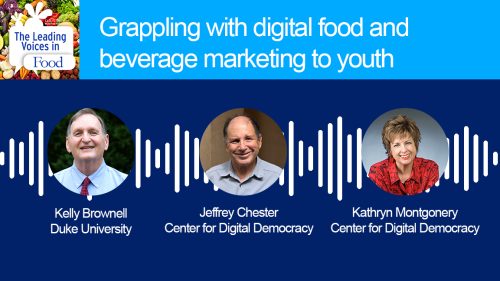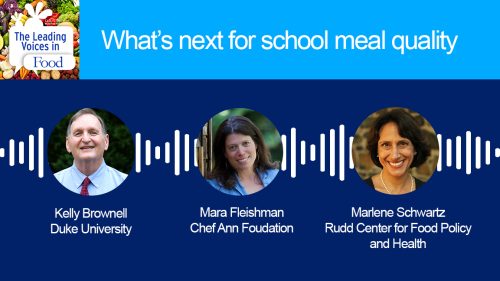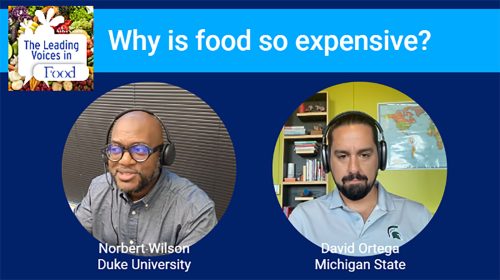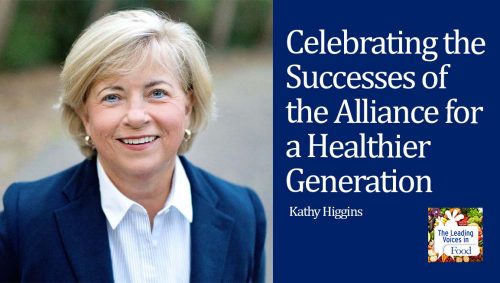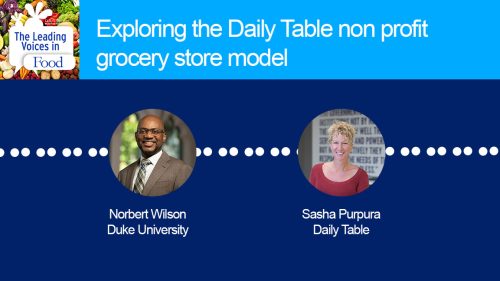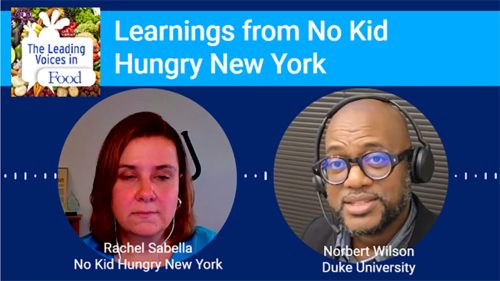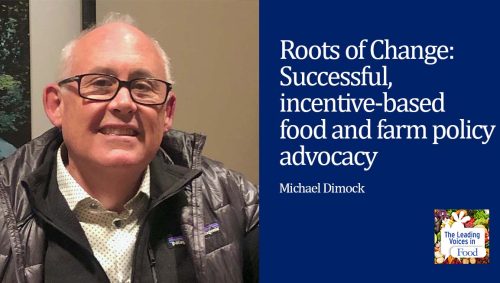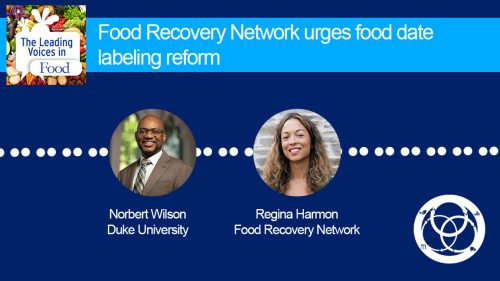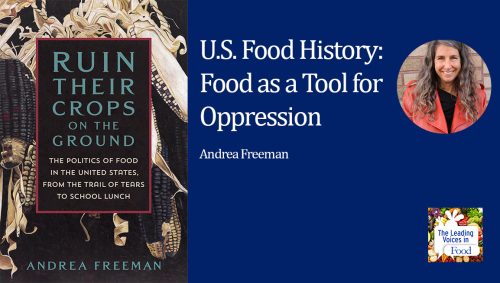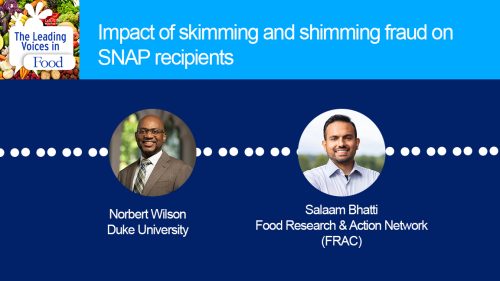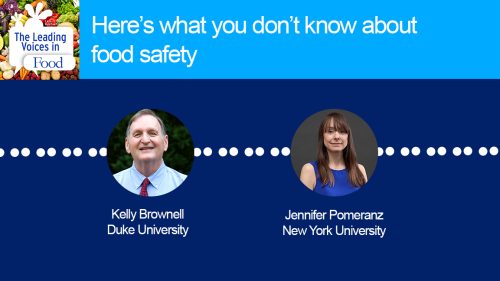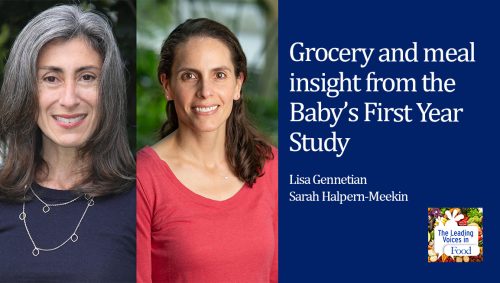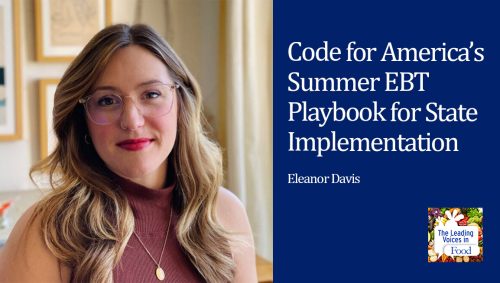E80: Janet Poppendieck – COVID Highlights the Problems with Charity Food
This podcast is part of a series focused on the impact of the COVID-19 pandemic. We’re exploring today, the role of charitable efforts to address food access. Places such as food banks, soup kitchens and food pantries. Janet Poppendieck has studied the emergency food system in the U.S. for decades. She is professor emerita of sociology at Hunter College, City University of New York and the author of the book, “Sweet Charity, Emergency Food and the End of Entitlement.”

Professor Janet Poppendieck has taught Sociology at Hunter College, City University of New York, since 1976. She received her undergraduate degree in History from Duke University (‘67) and her Masters (‘72) and PhD (‘79) degrees from the Florence Heller Graduate School for Advanced Studies in Social Welfare at Brandeis University. From 1988 until 2001, she served as director of the Hunter College Center for the Study of Family Policy, where she helped to start the Welfare Rights Initiative, the Community Interpreter Project, and the Language Diversity Initiative. Her primary concerns, both as a scholar and as an activist, have been poverty, hunger, and food assistance in the United States. A 1984-1987 W.K. Kellogg Foundation National Fellow, she has traveled widely in both the U.S. and the developing world. She serves on the Board of Directors of the Association for the Study of Food and Society and the Advisory Committees of City-as-School and the Welfare Rights Initiative. She lives in Brooklyn with her husband, Woody Goldberg; they are the parents of Amanda Goldberg. Professor Poppendieck is currently a member of the Department’s Personnel and Budget Committee.
Interview Summary
What a turbulent time for just about every part of life, but it’s especially true in the food system. So let’s begin by asking if you could help define for our listeners what you mean by charitable food system and how’s that phrase generally used.
By charitable food in the U.S. context, we mean the network of food pantries, which provide groceries for people to take home and prepare, soup kitchens, which provide meals, not necessarily soup, but food that can be consumed on the spot or nearby. And then the large warehouse level food banks that typically supply many of the soup kitchens and food pantries. Food banks themselves, about 200 of them, are affiliated into an organization called Feeding America. And then there are some dozens of independent food banks, no one quite knows how many, that are not affiliated with Feeding America, that solicits donations from food manufacturers, grocery stores, food storage facilities, like warehouses. Typically donations are overruns, overproduction of a particular food, products that may in some way be cosmetically compromised or just products nearing their “best if used by” date. Much of what comes in is food that was in some sense in danger of going to waste.
So, given that we’re in the throes of this raging pandemic, what’s happening with charitable food systems?
Well, for starters, they’ve become front page news. I think many more people in the United States are aware now of food banking, soup kitchens and food pantries because the need has escalated so rapidly. Many of us were taken aback at aerial photographs of literally hundreds and hundreds of cars lined up at food banks. At the very beginning, there was a kind of shakedown. Many food pantries are staffed totally by volunteers and most of those volunteers are senior citizens. And so when the word came that we older folks are especially vulnerable to COVID, many seniors had to give up their volunteer work and stay home. So for instance, in New York City, in the first few weeks of the shutdown, about 40% of the city’s food pantries closed. At the same time at the food bank level, the sort of wholesale low level, there was a pretty big mobilization to expand capacity. And food banks did that by shoring up some of their larger food pantries and soup kitchens that did have paid staff and greater age range in their volunteers, but also by putting prepared boxes into people’s trunks, so that they minimize the contact. As food banks learned the logistics of large scale distribution. At the same time, the department of agriculture, USDA, began purchasing and shipping food. There are a variety of food streams that run through USDA, but the one that’s been highest profile has been the Farm to Families Program, Sunny Purdue’s Blue Apron boxes in a new guise. Food banks were promised that these would be what they call, truck to trunk deliveries, that the contractors that got the contracts from USDA to package and deliver this food would be doing the distribution to needy families directly themselves. And these have typically ended up at food banks for distribution. That wasn’t the intent, but many of them turned out to not have that capacity and needed to deliver to the food bank where there are loading docks. So the food banks are pleading with the USDA and with Congress for some financial help to help absorb the costs because it’s essentially transfers the distribution costs of these contracts to them. So that’s kind of a thumbnail of what’s happened. It’s a system full of good intentions, but characterized by a fundamental inability to assure a reliable, equitable access to food. It’s grown larger and more entrenched. Directors have needed to expand their truck fleets, rent more warehouse space, and purchase additional freezers and coolers. So we’re seeing even more capital investment in the system.
So what weaknesses in the food system do you believe the pandemic has exposed?
I guess I’m going to start by saying, it’s exposed the fragility and unreliability of our income policies in the United States. Hunger, food insecurity, is fundamentally an income problem, not a food problem. And our income safety net was forged in the Great Depression when our economy was profoundly different from it is now. Just think of all the gig economy and the reliance on private contractors and the treating package delivery folks as private contractors, so that the companies won’t have to pay benefits. We’ve seen this massive shift in the U.S. economy toward individually managed workplaces, separating people from the kinds of benefits and security that they used to have through more typical corporation employment. So, we’ve seen a lot of people with their income totally stopped, who would not typically have been eligible for unemployment compensation. Congress took a much needed step in making private contractors eligible for unemployment under the pandemic provision, but we still have so many people who aren’t able to qualify or for whom the unemployment compensation is not enough to meet their housing needs. Housing costs in the United States as a huge consumer of household income has changed ability of families to weather a period without income. So, if we’re just clear for starters that it’s an income problem, not a food problem, then one of the weaknesses I see is this massive overreliance on charity as a way to meet the needs that are generated by loss of income – whether it’s system-wide loss of income like we’re seeing with the pandemic, or whether it’s the things that happen to families all the time, even in more normal times.
Starting in the 1980s, we saw a proliferation and expansion of charitable food pantries, and soup kitchens in the United States to reach a larger proportion of people in need, but still not able to provide the fundamentals of inadequate diet. Food pantries give out what they have, okay, they typically try to give out a three-day supply for each household size, but if they’re short, then they give out less. It’s not a system that is designed to sustain people over time. So the weaknesses of reliance on charity, I think, have been revealed intensified by the pandemic. And I think that the whole issue of creating a secondary food system for poor people, which is essentially what the charitable food system has become. With now needing, as I said, to make yet more capital investment. So making this likely to be an even the larger and more permanent part of the American food system, it troubles me.
I think we will emerge from the pandemic with a bigger, better food banking system, but inherently unable to establish and protect rights to food. When we made the big transition from working to expand and improve our public programs, which we did throughout the late sixties and 1970s, to a kind of wholesale shift to reliance on charity in the early eighties. We basically were substituting gifts for rights. And I think that’s not the direction that we need to be moving.
I don’t think this is our last pandemic. And I think that the disruptions related to climate change are going to create a whole series of emergencies. I guess I see this in a way as a wake-up call for a lot what’s to come. I’m sorry to see the increased and very high profile reliance on food banks. And don’t get me wrong, many of the people who are doing this work are really heroic. They really are giving of themselves working far beyond the capacity that many of us would have, but it’s not just that private charities can’t do the job, but it’s also that they kind of distract us from the more fundamental changes we need to make from creating an income security program that is inclusive that covers everybody in need. From raising wages, so that people who are working don’t need to turn to lining up for a handout to meet their family’s food needs. I have called it a moral safety valve. The givers and the donors, even the bystanders, when they see all of the publicity for food donation, food banks, food charities feel better. We feel better. Oh, someone is helping these poor people and it takes the pressure off and diverts us, I think, from looking at the structural inequality.
Are there some other things that you think could be done to build a more resilient food system? And how does this connect with your ideas about the right to food?
I think that to build a more resilient food system, they’re really two sides. I know this is really a kind of oversimplified, but there’s the demand side and the supply side. And on the demand side, I do think we need an incomes policy. We need adequate wages. I find myself giving more and more intention to the possibility of a universal basic income, which is something that years ago I was attracted to, but kind of saw as pie in the sky. And increasingly, I think it’s feasible and we should be exploring it.
But then there’s the supply side. Where is the food coming from? And our food system is characterized by highly concentrated industries in meat packing, 80% of the meat packing is done by the four largest firms. Economists use what they call a CR for a concentration ratio for being the four largest firms. In beef packing, the four largest firms control 80%. So that creates a vulnerability. And we saw some of the vulnerabilities with the packing houses with the spread of COVID, and I think terrible abuse of their workers of requiring them to work without adequate protection and the disruption of the fly provisions. So that farmers were having to smash eggs and euthanized pigs and a lot of images that Americans find very distressing.
So, I think that the pandemic should be teaching us to pay attention to the supply side. And what I think we need to do is decentralize, de-concentrate the food system, so that we need to nurture and there’s been a lot of terrific work over the last few years with younger people going into farming on a modest scale, participating in networks of direct marketing to consumers.
There are experiments all over the United States and lots of great stories to tell, but I think now is the time to bring this together and provide adequate support, so that every part of the United States can have a self-reliant, regional food system, rather than this kind of global food chain from which most of us get most of our food.
Public procurement purchasing on behalf of hospitals, jails, school systems, other programs where the local governments procure food can play a really significant role in shoring up this decentralized, localized and regionalized food system. This is because public procurement has the capacity to value something other than price in making procurement decisions. I’m a big fan of the Good Food Purchasing Program, which asks decision makers to consider health, valued workforce, sustainability, local community development and animal welfare in making decisions about sources of supply. I know you’re probably aware that Los Angeles unified school district was the first big school district in the country to commit to the Good Food Purchasing Program, but it’s spreading and we’re moving toward it in New York. A step at a time.
And I think we need to move in that direction, promote the idea of a Green New Deal, where I think food banks can play a very significant role, both as potential food hubs for these more decentralized system, but also because through their member agencies, they have a lot of connections to people on the ground who have been so poorly served by our current system and that food banks need to get themselves to the task of mobilizing people to support the sort of policies that would really guarantee both food security and income security.


